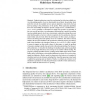Free Online Productivity Tools
i2Speak
i2Symbol
i2OCR
iTex2Img
iWeb2Print
iWeb2Shot
i2Type
iPdf2Split
iPdf2Merge
i2Bopomofo
i2Arabic
i2Style
i2Image
i2PDF
iLatex2Rtf
Sci2ools
125
click to vote
IWDC
2001
Springer
2001
Springer
Resource Stealing in Endpoint Controlled Multi-class Networks
Abstract. Endpoint admission control is a mechanism for achieving scalable services by pushing quality-of-service functionality to end hosts. In particular, hosts probe the network for available service and are admitted or rejected by the host itself according to the performance of the probes. While particular algorithms have been successfully developed to provide a single service, a fundamental resource stealing problem is encountered in multi-class systems. In particular, if the core network provides even rudimentary differentiation in packet forwarding (such as multiple priority levels in a strict priority scheduler), probing flows may infer that the quality-of-service in their own priority level is satisfactory, but may inadvertently and adversely affect the performance of other classes, stealing resources and forcing them into quality-of-service violations. This issue is closely linked to the network scheduler as the performance isolation property provided by multi-class schedule...
Related Content
| Added | 30 Jul 2010 |
| Updated | 30 Jul 2010 |
| Type | Conference |
| Year | 2001 |
| Where | IWDC |
| Authors | Susana Sargento, Rui Valadas, Edward W. Knightly |
Comments (0)

